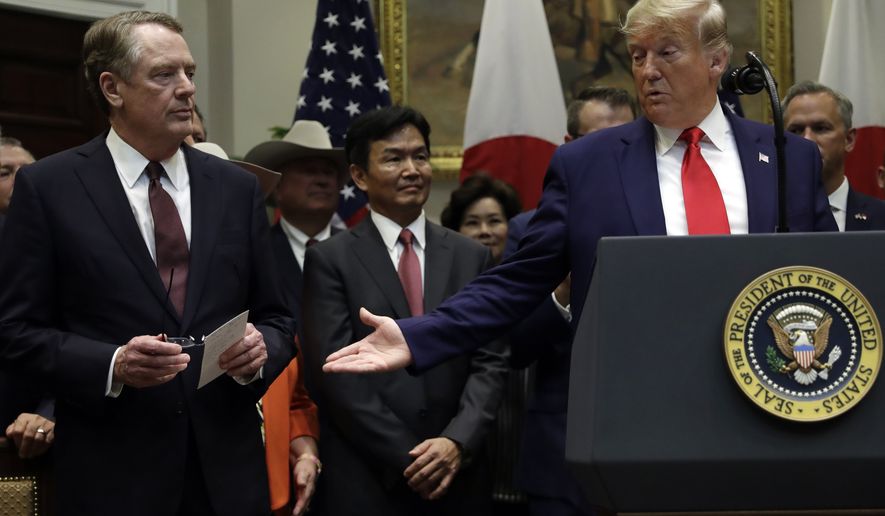The Trump administration signed trade agreements with Japan on Monday that will eliminate or slash tariffs on $7 billion worth of U.S. farm products and foster digital trade.
The White House said under the deal, Japan will cut its levies on American beef, pork, wheat, cheese, wine and other products. Once implemented, more than 90% of U.S. farm imports into Japan will be duty-free or receive preferential tariff treatment.
“These deals are a game-changer for our farmers and our ranchers,” President Trump said at the White House. “We love our farmers and we love our ranchers.”
The countries inked the deals as Mr. Trump prepares to slap levies on $7.5 billion worth of European Union imports in retaliation for years of unfair subsidies to Airbus, an aerospace company that is the main rival to Boeing. The tariffs will go beyond airplanes, however, potentially raising the price of a variety of agricultural goods, including French wines, Italian cheeses and cashmere from the United Kingdom.
Also, Chinese negotiators will travel to Washington on Thursday to restart talks in pursuit of an elusive U.S.-China trade deal.
“The relationship is very good. Whether or not we make a deal, I don’t know, but there’s certainly a good possibility,” Mr. Trump said.
Mr. Trump boasted that in the meantime, the U.S. is taking in “tens of billions” in tariffs from China.
The president refuted suggestions he had agreed to stay quiet about pro-democracy protests in Hong Kong to foster trade talks with Beijing.
He said the crowds of protesters appeared to be getting smaller, however, and reiterated his belief that President Xi Jinping could mediate the situation by meeting with a contingent of demonstrators.
“We’d like to see a very humane solution to that,” Mr. Trump said.
In the meantime, he’s touting a win with Japan.
U.S. Trade Representative Robert E. Lighthizer said Japan is the U.S.’ biggest market in beef, pork and wheat. The administration says the deal also will “boost” $40 billion in existing digital trade between the nations.
“This agreement will benefit trade in innovative products and services where the United States is a worldwide leader, and will ensure that American businesses have a level playing field in areas like video, music, e-books, and software,” the White House said.
Shinsuke J. Sugiyama, the Japanese ambassador to the U.S., said they were able to reach a deal because of the “fundamental trust” and “good relationship” between the sides, despite “fierce debates” in negotiations,
Mr. Trump and Japanese Prime Minister Shinzo Abe paved the way for Monday’s announcement by touting the first stage of a broader trade pact at the U.N. General Assembly in New York last month.
Mr. Trump and Mr. Abe are close friends and golfing buddies. They worked on trade throughout the year, with Mr. Trump agreeing to delay tough decisions until after Japanese elections this past summer.
• Tom Howell Jr. can be reached at thowell@washingtontimes.com.




Please read our comment policy before commenting.